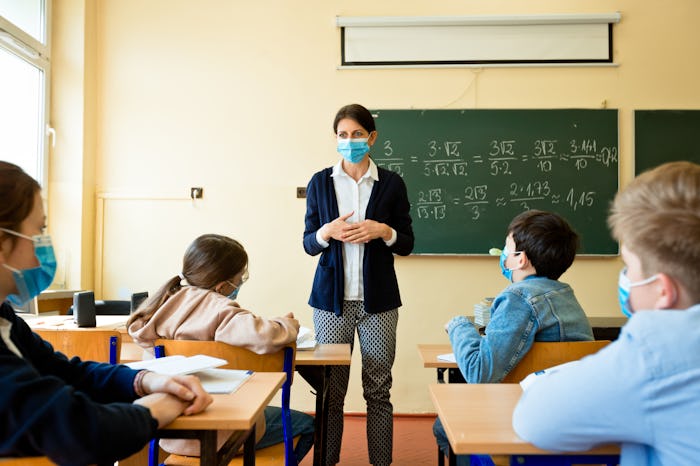Life

Are The CDC School Guidelines Better Than Quarantine? Experts Say It's Complicated
After two and a half months of distance learning, my kids are beyond ready to be back in the classroom next school year. Unfortunately, school will likely look entirely different from what kids last experienced before lockdown. But are the new CDC school guidelines any better than just being quarantined? Which scenario is actually better for a child's wellbeing?
"The costs and benefits of attending in-person school really depend on the child, the family, and the school," Dr. Shayna Coburn and Dr. Laura Gray, clinical psychologists at Children’s National Hospital tell Romper.
It is still unclear what exactly schools will look like when students are allowed to return. The Centers for Disease Control and Prevention recently released a set of considerations for schools that includes precautions like posting signage about reducing viral spread, keeping children's belongings separated, and spacing desks 6 feet apart while facing all the same direction, among a number of other suggestions.
"Young children before the age of 7 or 8 years of age may have difficulty following strict guidelines, which include social distancing, no touching other students, and wearing a mask, especially if they're special needs," Maureen Healy, child psychologist tells Romper. "Some students may experience greater stress and anxiety from these strict protocols unless they're communicated in a very child-friendly and intelligent manner."
For as ready as I am to get back to some sense of normalcy, I cannot imagine my newly-minted 6-year-old understanding why school suddenly isn't a fun and happy place to be. Between mask-wearing, social distancing, and the potential closure of communal spaces like cafeterias, gyms, and playgrounds, attending school sounds like it might be more trouble than it's worth when it comes to a child's mental health, but experts say it truly depends on the child and their needs.
"From a social and emotional standpoint, although it may be challenging to return to school under these new circumstances, there are a number of potential benefits to in-person school," Dr. Colburn and Dr. Gray tell Romper.
Between working on group projects, engaging in an in-person conversation, and developing conflict resolution skills, students can still gain invaluable skills while maintaining the new CDC recommendations for safety. "There is something meaningful to being in the presence of other people, even 6 feet apart or between barriers, that helps children learn and develop social and emotional skills," Colburn and Gray tell Romper.
Plus, for plenty of parents who work, school provides a safe environment for their kids to be during the day and relieves the burden of trying to help with distance learning while keeping up with work obligations.
"It’s also important to remember that, for many families, school is an invaluable resource not only for learning, but receiving additional services such as free meals, special education, counseling, and a multitude of therapies provided at schools," Colburn and Gray tell Romper.
Dr. Nermeen Dashoush, Early Childhood Education Professor at Boston University suggests that while the CDC recommendations are intended to keep kids safe, the onus should be on the school officials to maintain healthy practices, not the students.
"We have to create procedures within the schools, not expectations for the children. These procedures include staggering arrival and dismissal, clearing high touch areas, reporting illness, areas, etc.," Dashoush says. "We need to limit the pressure on children to prevent feelings of guilt and increased anxiety. We cannot have 5-year-olds, who are still developing their sense of personal space, walking around thinking they will make someone severely sick if they get too close."
For children with compromised immune systems or other health complications, regardless of what precautions are taken to make a return to school safe, the option to continue learning from home may be the best route to take.
"Every parent needs to consider health first and foremost, and then what is best for their family and child's education — whether it's going to school in-person or continuing in a homeschooling or distance format," Healy says. "Remember, a lot depends on the age, personality, and capacities of the child."
It is important to note that while some children are thriving in a distance learning environment and some will have to stay home due to health concerns, keeping it up long term will require major adjustments. Dashoush tells Romper that what parents are experiencing right now in quarantine is not homeschooling. "It is distance learning that was designed last minute by educators who did their best to maintain some form of instruction. It was not designed to be long term, and if schools open, then teachers will need to focus on the instruction of the children who are there."
Regardless of whether or not your child will return to school in the fall, changes to their learning routine are inevitable. This is all just a part of the new normal as parents navigate the challenges brought on by this pandemic.
"There is no magic wand where things are better or worse for all children. Some students thrive in one environment, while others thrive in another environment," Healy tells Romper. "The bigger question becomes how do we help our children learn flexibility and resilience through these situations — that's the real question."
Experts:
Dr. Shayna Coburn and Dr. Laura Gray, clinical psychologists at Children’s National Hospital
Dr. Nermeen Dashoush, Early Childhood Education Professor at Boston University and Chief Curriculum Officer at MarcoPolo Learning
Maureen Healy, Ph.D, child psychologist, author of The Emotionally Healthy Child, and parenting coach at Growinghappykids.com
This article was originally published on